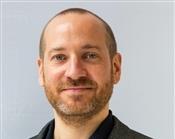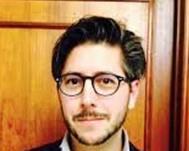THE TEAM OF LECTURERS
■ ■ ■
Coordinator MA Cultural History and Heritage History and philosophy of historiography









■ ■ ■
Cultural heritage; museum studies; material culture; Soviet and Russian history
■ ■ ■
Public history; memory; life writing; egodocuments; race; gender
■ ■ ■
Heritage ethics; cultural landscapes; memory politics; Soviet and Russian history
■ ■ ■
Digital text analysis; history of science; history of ideas; conceptual history
■ ■ ■
History of media and publishing; consumer culture; visual culture; transatlantic relations; interwar history; modern German history
■ ■ ■
History of the body, gender, emotion, sexuality, medicine, psychiatry; cultural theory
■ ■ ■
Memory; comparative colonialisms; postcolonialism and material culture; British Empire; Germany and Africa
■ ■ ■
History of emotions; history of crime; body history; queer theory
D R P IETER H UISTRA
D R M ARIJKE H UISMAN
DR P IM H UIJNEN
DR J ULIE D E S CHEPPER
DR G ERTJAN P LETS
DR J OCHEN H UNG
DR W ILLEMIJN R UBERG
DR B RITTA S CHILLING
D R E LWIN H OFMAN
Song culture; history of music; intangible cultural heritage; history of emotions


■ ■ ■
D R R ENÉE V ULTO
■ ■ ■
D R
F LORA R OBERTS
Environmental history; history of Central Asia; history of migration; history of imperialism
STUDY ADVISORS
Facing issues with your studies? The study advisors are there to help and support you to successfully complete your degree. They can act as confidential counsellors, advise on issues regarding illness and special circumstances and, together with you, look at the possibility to cope with the studies while dealing with disabilities or chronic illnesses. They can also help with specific arrangements and procedures, such as complaints, objections and appeals. You can find more information on the university website, at: Support, Wellbeing and Advice - Cultural History and Heritage - Students UU Click on the name of the study advisor to see who to contact if you have questions about your programme.



■ ■
■ E VELIEN H AZEWINKEL ■ ■ ■ M IRJAM VAN D EUTEKOM ■ ■ ■ M AJED Z
AIN
THIS PROGRAMME
When you have finished the MA Cultural History and Heritage you will be both an expert of culture in the past and the uses of history in the present. You will learn about the cutting edge of cultural theory, public history and critical heritage studies, and will put them to practical use in historical case studies and at the workplace in cultural institutions. This one-year programme will be a ride that may take you from current debates on historical museums, to nineteenth-century histories of sexuality, back to the impact of newspapers on democracy in the twentieth century. You may write a thesis on the dealings with colonial heritage after you have landed an internship at a leading heritage institution in the Netherlands (or abroad). But these are just some examples of what our students over the past few years have done. What we can guarantee is that as a graduate of our programme you will be at the frontier of cultural history, heritage and public history.
EDUCATIONAL PHILOSOPHY
It is our commitment to hand you the instruments to form yourself into an independent critical thinker in the field of cultural history and heritage. By developing and using your own voice in the fields of culture, heritage and public history, you will stand out on the job market in cultural/heritage sector. As lecturers we employ an encouraging didactics, which means that as a student you can expect clear communication, respectful treatment and feedback that will help you explore new horizons. In return, we expect our students to be prepared and participate in class. You will not be offered the opportunity to lay back and listen to your lecturer – our seminars consist of active discussions and depend on your contributions.
On the student website you will find more information about your programme, ranging from an overview of courses to policies and procedures.
THIS MASTER’S PROGRAMME AND SOCIETY
While our teaching and research deal with the past, we are firmly committed to the needs of the present. The topics we study – the advent of mass media, colonialism and its legacies, the development of knowledge societies, or the uses and abuses of heritage, to name but a few – connect to the needs and concerns of present societies. It is our ambition to bring our academic expertise on these topics into classroom discussions.
Our programme links to society through its stress on community-engaged learning, and through the internships, on which you will find more information below. Important to note is that one in five of our students land their first job at their internship institution. Many of our alumni have found work in public history and heritage, while others have moved on to the civil service, education and journalism. Read more about career development
This programme offers an English track and a Dutch track. The modules offered in these tracks are the same – only the language of instruction differs.

COURSE PLANNER: You will find more information on this programme’s courses in the Course Planner: https://cursusplanner.scien ce.uu.nl/english/study/GECHME-21

THE PROGRAMME’S STRUCTURE
In the first block you will learn about the theory, methodology and practice of cultural and public history. In block 2 you will put this knowledge to use in the tutorials: in small groups you will work on a topic within the research expertise of the supervising teacher. You choose three tutorials out of nine options.
Semester 1
Block 1 Block 2
Understanding Culture in the Modern World
Tutorials (choose 3 out of 9)
1. Unmasterable past: dealing with difficult heritage
2. The Future of Museums
3. Digital History of Concepts
4. Popular Culture and the Crafting of Citizens
5. Postcolonial Memory and Heritage
Semester 2
Block 3
Block 4
You select one of the following options:
1. Internship
2. International exchange
Public History, Memory and Global Heritage Thesis (15 EC)
Sources and Methods (5EC)
6. Crime and Emotions
7. Digital Heritage
8. Environmental History
9. Comparing Global Archives
Cultural Career Seminar Cultural History and Society (career orientation)
Internship
Representing a perfect chance to put academic know-how into working practice, the cultural history internship not only serves as a vital link between academic study and the labour market, it is also the perfect opportunity to better come to grips with your talents, skills and abilities and to explore the societal value of your university education.
The focus lies on ensuring better employment prospect by gaining practical professional experience, building a strong CV and develop a professional network. Many students do an internship related to the field of cultural history, such as a museum, (heritage) institution or an educational institute, but you can also opt for one of the research-based internships, where you will be working on cutting-edge projects with Utrecht researchers. During the internship, you will learn to apply knowledge, theories, and methodology of cultural history and heritage you learnt during the master's programme.
The internship coordinator will assist you in finding and internship opportunities will be regularly shared. During the cultural career seminar networking and job interview skills will be trained. The UU also offers
grants to students that wish to do their internship abroad (within the European Union). For more information about the administrative context of the internship please consult the student website
Public history internship + thesis (selective)
In the academic year 23-24 we continue to offer a special public history graduation trajectory, in which you combine your internship and your thesis. There are five spots in this trajectory with our preferred partners such as Museum Huis Doorn and Landschap Erfgoed Utrecht. If you follow this trajectory, you will not graduate on a regular MA Thesis, but you will instead work on a product of public history decided by the host institution, such as a podcast, an exhibition or a documentary. Candidates will be asked to apply during the first block – and the preferred partners choose students based on their application letters, cv’s and an interview.
Thesis
The Master’s thesis is the programme’s final exam A thesis is 12,000-18,000 words in length (excluding footnotes/endnotes, title page, and bibliography) for 15 EC.
The thesis will be the result of your own, original research but you will be guided by a personal supervisor during the process, as well as receiving feedback from other Cultural History Staff members throughout the year. You will start your Thesis already in block 2. Out of the three tutorials you will select one as your Thesis tutorial. This means that the lecturer in this tutorial will also be your thesis supervisor. Within this tutorial you will write an outline and a workplan for your Thesis,
The thesis process is divided into five steps:
S TEPS
Step 1: picking one of your tutorials as your thesis tutorial
Step 2: writing an outline and a workplan for your thesis
Step 3: doing your research, writing and presenting your first chapter
Step 4: writing the first version of your thesis
Step 5: rewriting, submitting and defending your thesis
A more elaborate explanation of the Thesis and the exact times and dates of the deadlines will be distributed to you during the Introduction days and will become available on Blackboard.
Cultural Career Seminar
Throughout the year we help you prepare for your future in the Cultural Career Seminar. In lectures and speed dates recent alumni and established cultural historians will share their experiences on finding a place on the labour market, their work and the different fields they work in – from museums and heritage institutions to ngo’s, policy, journalism, commercial companies and more. The Career Office offers workshops to find your motivation and work values, transform general ambitions into practical goals, and to provide you with tools to network. Join the ‘Cultural History @ Utrecht University’ group on LinkedIn to see where alumni end up, connect with them and stay in touch for future students looking for a start of their careers.
PROGRAMME DATES AND DEADLINES, TO NOTE IN YOUR DIARY
Introduction Days: 5 September 2023
Excursion abroad: 8-10 November 2023 (to Berlin)
IMPORTANT FOR HUMANITIES STUDENTS
New students students.uu.nl/hum-new Practical information for new students at the Humanities faculty.
Academic calendar students.uu.nl/hum-calendar
Information about days off, course registrations and change-of-enrolment days.
UU online

Information about our online systems and how to log in: students.uu.nl/hum-online In need of a manual? IT manuals: https://manuals.uu.nl/en
REGISTRATION, PROCEDURES, INTERNSHIP INFO
Student Information Desk Humanities students.uu.nl/hum-contact
Programme related matters, such as
• course registration
• course schedules
• study results & study progress (Osiris)
• graduation
Student Services students.uu.nl/en/contact/student-services
Studying at Utrecht University in general:
• registration as a UU student

• tuition fees
• elite athletes
• disability or chronic illness
Internship coordinator students.uu.nl/hum-internshipcoordinator


Information about:
• guidelines and procedures
• internship placements
QUESTIONS ABOUT ENTERING THE JOB MARKET
Career Services students.uu.nl/hum-careerservices
Advice on getting a job after graduation through workshops, CV check-up, and coaching. Your programme coordinator will inform you about programme-specific events.
NEED EXTRA HELP?
Study advisor: students.uu.nl/hum-studyadvisor






Student psychologist: students.uu.nl/psychologist
Workshops: Skills Lab: students.uu.nl/en-skillslab
THINKING OF GOING ABROAD ?
International office Humanities: students.uu.nl/hum-io
OTHER FACILITIES
University Library: students.uu.nl/hum-library
Olympos sports centre: olympos.nl/en-us/home.aspx
Parnassos cultural centre: uu.nl/en/parnassos
FACT! You can find your grades, student card and timetable in the MyUU portal and the MyUU app: students.uu.nl/en/myuu and students.uu.nl/en/ myuu-app
FACT! In the second semester, you will have to register in Osiris for courses you wish to attend. If you want to switch courses, you can do so on the change-ofenrolment days before the start of the relevant block.
FACT! Deadlines are always listed in the course syllabus, which your lecturer will provide approximately 2 weeks prior to the course’s ’start.
FACT! If you need more information about specific aspects of your programme, e.g. internships or thesis, please see the Curriculum page on the programme website via students.uu.nl/hum.
FACT! Check students. uu.nl/hum-studentlife for information about living, jobs, sports and leisure in Utrecht!
© June 2023. Utrecht University, Faculty of Humanities. Every effort has been made to ensure that the information presented in this factsheet is correct and up to date. Utrecht University cannot be held liable for any false, inaccurate, or incomplete information presented herein.




















